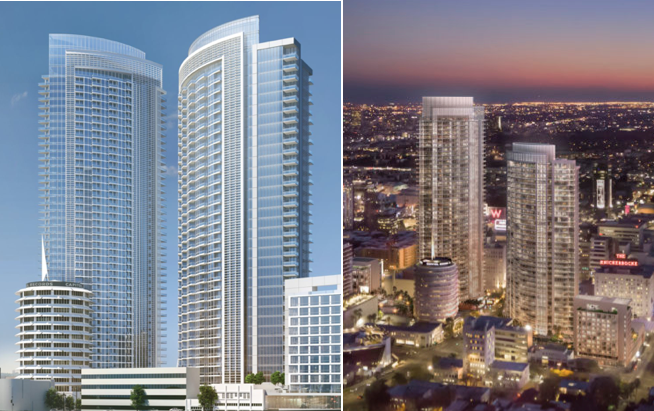CommentsDEEGAN ON LA-City Hall has been locked down to the public for the past several “at home” weeks,
and that action has been used to lock out community activists who object to what they see as a prospective tragedy: the proposed Millennium Towers in Hollywood, recently renamed The Hollywood Center Project. (photo above, left)
It’s a pair of mixed-use towers -- 35 stories and 46 stories -- with 1,005 residential units, and two 11-story mid-rise buildings. The proposed project will be located at Hollywood and Vine, adjacent to the landmark Capitol Records building that will become dwarfed and visually lost by the skyscraper intrusion.
A draft Environmental Impact Report was released on April 16 that started a 45-day period for the public to review the plans and comment no later than the end of May.
Community activists have been fighting the project for seven years, ever since the Los Angeles City Council unanimously approved it on July 24, 2013. Litigation followed. And the community continues to fight and is not giving up.
With the reduction of City Hall meetings (which is closed anyway to the public), and the suspension of Neighborhood Council meetings, there’s been little opportunity to bring community activists and NC board members into the conversation, except on a private, individual basis by sending emails “for the record” to City Planning.
Our city is becoming more starkly divided between the haves and have-nots. Not only when it comes to economic resources, but also in having a voice as to what building projects will go forward. Here, the inequity has become huge.
Who should be in the ongoing development conversation? Some hopefully clean Councilmembers, the developers and their enablers in City Planning, and a collection of community activists ranging from homeowner and residents’ associations, as well as the publicly elected city officials on Neighborhood Councils.
Unfortunately, however, community activists and NC boards are being left out in the cold, with the pandemic given as a reason they cannot officially meet to deliberate on neighborhood issues. This includes the controversial Hollywood Center Project.
City Council now meets once, not three times a week. The city’s ninety-nine Neighborhood Councils used to meet monthly, but since the pandemic, they haven’t been meeting at all.
While the NCs have been put on “pause,” the city planning and permitting processes keep barreling ahead at full speed. Not everyone is on the same hiatus.
Anastasia Mann, the President of the Hollywood Hills West Neighborhood Council (HHWNC), the largest and one of the first NCs formed within the City of Los Angeles, was unable to have the NC communicate officially with the city because all NC activities had been suspended during the “at home” mandate.
Writing as an individual to City Planner Mindy Nguyen, Mann pointed out that “A project of this size and long-term controversy should not be smuggled through the process. . .particularly at a time when the citizens of LA are reading daily of bribery and graft going on at City Hall and within our City Council. There is little trust factor currently re our ‘Planning’ process and implied shenanigans about development deals happening within City Hall -- particularly as this is a high-end project.”
Asking for more time for the public and NCs to weigh in, or for there to be a suspension of the process until “at home” rules are lifted, Mann was told by Nguyen that deadlines “have not been suspended and the provisions governing public review remain unchanged.” She referred Mann to the Environmental Impact Report.
Mann told CityWatch that “this 12,000 page document is virtually impossible for most people to interpret let alone access and be motivated to read, hence the need for interpretation and pro and con LIVE publicly noticed discussions at the NC level, particularly in the Hollywood area.”
Weeks ago, the Department of Neighborhood Empowerment, aka DONE, announced that “all Neighborhood Council (NC) board, committee, alliance, and liaison meetings -- as well as all other NC-related events -- are currently suspended.”
Raquel Beltran, General Manager of DONE, shared with CityWatch that “Neighborhood Councils were advised on April 17 that they would resume meetings effective May 1, 2020.” She provided a link to the EmpowerLA Virtual Governance page dedicated to supporting NCs in this transition.
Beltran explained to CityWatch that “Several NCs have already held meetings since last Friday. We developed an EmpowerLA Virtual Governance Plan timeline, and related protocols modeled after the City of Los Angeles protocols, adapted to the NC System. Two webinars on parliamentary virtual governance and two trainings on running NC virtual meetings were held over 5 days. NC board members were surveyed on their governance and digital proficiency. Approximately 800 board members participated in the webinars and training, over 1/2 of the NC board members in the System. This has never happened before, to my knowledge. Additionally, the Department purchased a Zoom license for each NC and we are developing outreach tools for their use in informing the public on how to access NC board meetings."
While it is good news to be getting the NCs fully functional again, it comes a little late for the current protests against the Hollywood Center Project, which closes the book on public comment in two weeks.
As Mann points out, “live publicly noticed discussions at the NC level” are the only possible way to do business with a city apparatus that has proven to be in the pocket of developers.
(Tim Deegan is a civic activist whose DEEGAN ON LA weekly column about city planning, new urbanism, the environment, and the homeless appears in CityWatch. Tim can be reached at [email protected].) Edited for CityWatch by Linda Abrams.

















